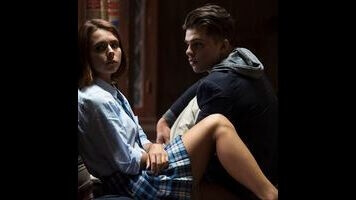Skip Wuthering High School

Emily Brontë’s 1847 novel, Wuthering Heights, is perfect for a classroom milieu: Much in the same way Romeo And Juliet appeals to the high school set, Wuthering Heights is all about high-strung emotion gussied up in pretty language. It’s part all-consuming love story, part revenge fantasy gone wrong, part unrequited amorous tragedy. What can be more high school than that? There’s a reason the novel makes for a killer Kate Bush song. It’s even surprising that it has taken so long for Wuthering Heights to be moved to the high school setting, if only because of its renewed popularity due to the Twilight series. A decade after the first Twilight book was released, the Earnshaws head to high school in Lifetime’s Wuthering High School.
Wuthering High School feels like a step away from what the network has been doing in recent years with its signature original movies: employing female directors and booking prominent actors for efforts that go beyond the Tori Spelling classics of yesteryear. Wuthering High School feels much more like those retro made-for-TV movies, focusing on the histrionics of Brontë’s sole novel, taking its spine but leaving out its soul.
Take the setting: Brontë set Cathy and Heathcliff’s unhealthy love story on the tumultuous moors for a reason. Yet Wuthering High School takes the setting to sunny Malibu. Instead of a third party, Cathy Earnshaw (Paloma Kwiatkowski) tells her own story. Depressed after her mother’s suicide, Cathy rebels against the A-crowd that she used to be a part of, like a dour Veronica Mars without any purpose. Her lust for life is renewed with the appearance of Heath (Andrew Jacobs), who is taken in by Cathy’s father, Earnshaw (James Caan), after Heath’s mother, an employee of Earnshaw’s, is deported. Other familiar names populate Cathy and Heath’s world, twisted to fit the purposes of high school melodrama (Nelly is turned into Ellen, for those who felt the source material needed a Regina George stand-in). It doesn’t matter so much that Brontë’s plot is eschewed for something different. The time jump in the novel, and its more outlandish plot points—kidnapping, forced marriage—would necessitate change in any updated material. Shakespeare would barely recognize 10 Things I Hate About You as The Taming Of The Shrew; same goes for Jane Austen, Clueless, and Emma.
But those films still contain the basic heart of their sources. Heath and Cathy are supposed to be burning with passion. While Cathy rejects Heath on the basis of his lower class, she admits the real reason to her confidant: “He’s more myself than I am. Whatever our souls are made of, his and mine are the same.” Here are two people who burn so brightly for each other that they destroy each other. But Kwiatkowski and Jacobs are so flat that their supposed epic love story is boiled down to a couple steamy make-out scenes. At one point, lovestruck Eddie—Wuthering High School’s Edgar Linton equivalent—explains that he’ll always love Cathy because of an unexplained inner light, comparing her to a movie star. Alas, we can only take his word for it, because Kwiatkowski doesn’t display such qualities, a problem for an actress playing one of literature’s great insufferable and wild women. The plot structure allows for some kind of insight into the class divisions between Cathy and Heath that keep them apart, but that’s just used a smoke screen so the movie can send its pretty, lingerie-clad teenagers to a Eyes Wide Shut-esque party.
But Wuthering High School’s biggest sin is that it’s boring, something the novel, with its soap operatics adorned in gorgeous language, can’t claim. The pace languishes as Kwiatkowski lifelessly narrates what’s supposed to be a tale of passion. The final scene takes a turn for the macabre, which is impressive considering the source material does not end without its own dramatics. But it’s too little, too late, and too strange to help what came before it.